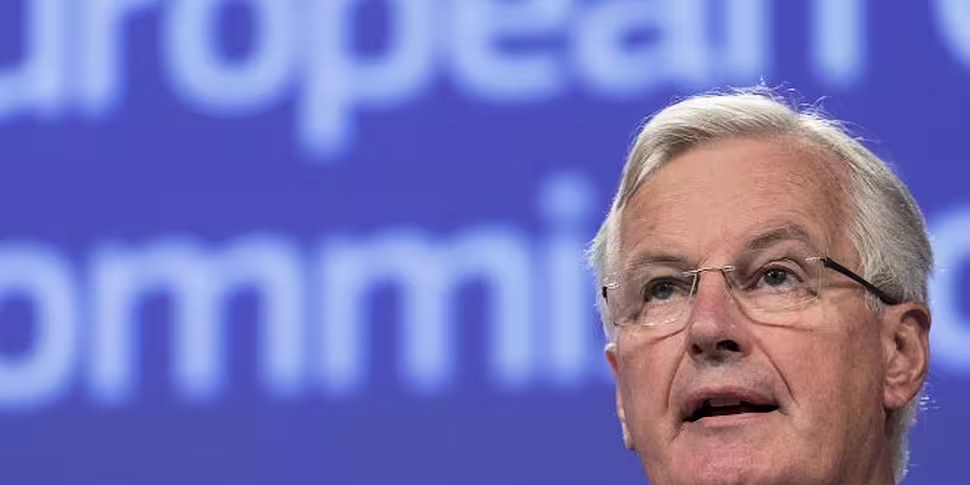The European Union’s chief Brexit negotiator has again called on Britain to set out how it hopes to protect the Good Friday Agreement following Brexit.
This afternoon, Michel Barnier warned that the British Prime Minister’s landmark speech on Brexit failed to provide any clarity on the issue of the Irish border.
In a wide-ranging speech to European leaders in Florence this afternoon, Theresa May insisted her government will never accept any “physical infrastructure” on the border.
She said Britain had “recognised from the outset that there are unique issues to consider when it comes to Northern Ireland.”
She pledged the negotiations would “protect progress made in Northern Ireland over recent years and the lives and livelihoods that depend on this progress” adding that both sides remain committed to preserving the Belfast Agreement and the Common Travel Area.
Lack of clarity
In a statement this afternoon, Mr Barnier noted that the UK is the “co-guarantor of the Good Friday Agreement.”
“Today's speech does not clarify how the UK intends to honour its special responsibility for the consequences of its withdrawal for Ireland,” he said.
“Our objective is to preserve the Good Friday Agreement in all its dimensions, as well as the integrity of the Single Market and the Customs Union.”
Constructive #FlorenceSpeech by PM May; must be translated into negotiating positions to make meaningful progress https://t.co/fCfBrqNhAp
— Michel Barnier (@MichelBarnier) September 22, 2017
Cautious welcome
Meanwhile, the Taoiseach Leo Varadkar gave a cautious welcome to Mrs May’s speech.
“I think it is a genuine effort by the prime minister to move things along and make progress,” He said in comments to journalists quoted by Reuters.
“We will of course need further clarity and further understanding as to how a transition period might work.
“But requesting a transition period is also a step in the right direction.”
He welcomed Mrs May’s pledge to support the Good Friday Agreement as well as her promise that there would be no physical border on the island of Ireland.
Outstanding issues
The Foreign Affairs Minister Simon Coveney said the speech provided “additional clarity” but warned there are “still many outstanding issues” and a lot of work to be done before negotiations can move on to Britain’s future relationship with the EU.
“The key thing now is that today’s comments by Prime Minister May are translated into deliverables across the negotiating table in Brussels,” he said.
“Ultimately Ireland wants the gains of the peace process protected, including avoiding a hard border; an orderly UK withdrawal; a sufficiently long and non-disruptive transition arrangement; and the closest possible EU-UK future relationship - including in trade, which minimises to the greatest extent possible the impact on the Irish economy.”
Landmark speech
Theresa May used her second major speech on Brexit to set out her vision for a future partnership between the EU and the UK.
She called for a time limited “implementation period” to be put in place while the details of Britain’s final exit from the bloc are hammered out.
She said she expected the transitional period to last approximately two years from the official exit date in 2019 – with Britain bound by EU rules until the period is complete.
She also promised that the UK would “honour its commitments” to the EU budget – a clear hint that it would be willing to pay up to €20m into the budget during the period.
Constructive spirit
This afternoon Mr Barnier said the speech showed a “willingness to move forward” with time drawing short for negotiators.
He said the EU would now consider Mrs May’s request for an additional implementation period – adding that Britain would have to agree to be bound by existing EU rules throughout the period.
He also welcomed Mrs May’s pledge that the rights of EU citizens would be enshrined in the final Brexit treaty – but called for the pledge to be “translated into a precise negotiating position of the UK government.”
“Our priority is to protect the rights of citizens,” he said.
“EU27 citizens in the United Kingdom must have the same rights as British citizens today in the European Union.
“These rights must be implemented effectively and safeguarded in the same way in the United Kingdom as in the European Union.”
Sufficient progress
He said the EU will continue to insist on sufficient progress in key areas regarding the UK’s orderly withdrawal from the bloc – Ireland, citizens’ rights and the Brexit bill – before opening negotiations on a future trading relationship
“We look forward to the United Kingdom's negotiators explaining the concrete implications of Prime Minister Theresa May's speech,” he said.
“Our ambition is to find a rapid agreement on the conditions of the United Kingdom's orderly withdrawal, as well as on a possible transition period.
The fourth round of negotiations gets underway in Brussels this Monday September 25th.









